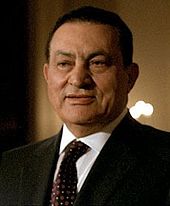|
|

Hosni Mubarak: Egypt's Longest-serving President
|
Share This Page
|
|
|
|
|
|
|
Follow This Site

|
 |
|
|
Hosni Mubarak was a career military officer before entering government. A graduate of the country's Military Academy and the Air Force Academy, he served in the Egyptian Air Force as a pilot and an instructor, eventually becoming Chief of Staff for the Egyptian Air Force.
Mubarak's career in politics began in 1975, when then-President Anwar Sadat appointed Mubarak as Vice President. The two men continued in their respective positions until Sadat was assassinated in 1981. Mubarak ascended to the presidency, continuing the state of emergency that had existed in the country since the Six Day War in 1967.
 Since 1981, Mubarak has remained president, with a tight grip on power and on political opposition and expression. He ordered that referendums be held in 1987, 1993, and 1999, and his government continued. In 2005, Egyptian voters had their choice of presidential candidates, but official vote tallies showed that Mubarak had been re-elected by a wide margin. Since 1981, Mubarak has remained president, with a tight grip on power and on political opposition and expression. He ordered that referendums be held in 1987, 1993, and 1999, and his government continued. In 2005, Egyptian voters had their choice of presidential candidates, but official vote tallies showed that Mubarak had been re-elected by a wide margin.
Under Mubarak's leadership, Egypt has been a member of the allied coalition against Iraq in the 1991 Gulf War and, despite being a major ally of the United States in many respects, an opponent of the U.S.-led invasion of Iraq, in 2003. Mubarak has also been supportive of Israel, in a Middle East that is nearly always defined by religious conflict.
On Mubarak's watch, Egypt became a major player in the natural gas production market. Revenues from gas exports and from tourism continued to drive the economy, as did a rejuvenated stock market.
Mubarak became very unpopular in early 2011, as a result of a number of factors, including the continuation of the state of emergency — which allows extended police powers, suspension of some constitutional rights, and the legalization of censorship. Mubarak, who was 82 in 2011, planned to have his son Gamal succeed him as president and leader of the National Democratic Party. But protests in the streets of Cairo, Alexandria, and other cities forced Mubarak to announce that he would not seek re-election.
|
|